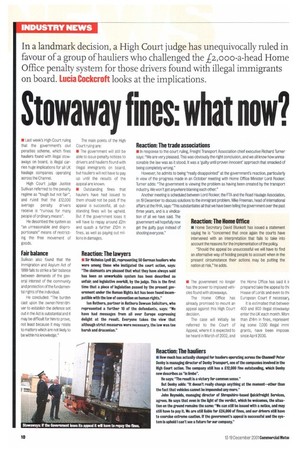Stowaway fines: what now?
Page 10

If you've noticed an error in this article please click here to report it so we can fix it.
• Last week's High Court ruling that the government's civil penalties scheme, which fines hauliers found with illegal stowaways on board, is illegal carries huge implications for all UK haulage companies operating across the Channel.
High Court judge Justice Sullivan referred to the penalty regime as "tough but not far, and ruled that the £12,000 average penalty drivers receive is "ruinous for many people of ordinary means".
He described the system as "an unreasonable and disproportionate" means of restricting the free movement of goods.
Fair balance
Sullivan also found that the Immigration and Asylum Act of 1999 fails to strike a fair balance between demands of the general interest of the community and protection of the fundamental rights of the individual.
He concluded: The burden cast upon the owner/hirer/driver to establish the defence set out in the Act is substantial and it may be difficult for him to prove, not least because it may relate to matters which are not likely to be within his knowledge." The main points of the High Court ruling are: • The government will still be able to issue penalty notices to drivers and hauliers found with illegal immigrants on board, but hauliers will not have to pay up until the results of the appeal are known.
• Outstanding fines that hauliers have had issued to them should not be paid. If the appeal is successful, all outstanding fines will be upheld. But if the government loses it will have to repay around £2m and quash a further .212m in fines, as well as paying out millions in damages.
Reaction: The lawyers
• Sir Nicholas Lyell QC, representing 50 German hauliers who were among those who instigated the court action, says: "The claimants are pleased that what they have always said has been an unworkable system has been described as =fair, and legislative overkill, by the judge. This is the first time that a piece of legislation passed by the present government under the Human Rights Act has been found incompatible with the law of convention on human rights."
Ian Rothera, partner in Rothera Dawson Solicitors, who represented a further 10 of the defendants, says: "We have had messages from all over Europe expressing delight at the result. Everyone takes the view that although strict measures were necessary, the law was too harsh and draconian." • The government no longer has the power to impound vehicles found with stowaways.
The Home Office has already promised to mount an appeal against this High Court decision.
The case will initially be referred to the Court of Appeal, where it is expected to be heard in March of 2002, and the Home Office has said it prepared take the appeal to thE House of Lords and even to thE European Court if necessary It is estimated that betweel 400 and 800 illegal stowaway: enter the UK each month. MorE than .£14m in fines, represent ing some 7,000 illegal immi grants, have been impose( since April 2000.
























































































































































